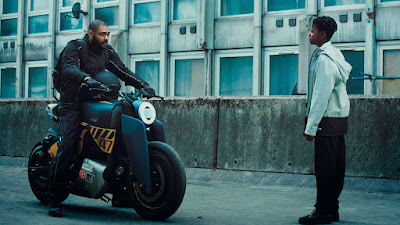
JUDAS AND THE BLACK MESSIAH is a stunningly made, deeply affecting, beautifully acted, chamber drama about the events that led to the real life assassination of Black Panther leader Fred Hampton in 1969 at the age of just 21. His age is startling when we see him portrayed with such power, conviction and charisma in an award-winning performance by British actor Daniel Kaluuya. His Hampton is thickly accented, profoundly articulate and rousing in his stirring message of black activism and social aid. We are carried away by his powerful presence, just as Dominique Fishback's quiet poetry-loving student Deborah Johnson is, and her subtle but profound performance is equally award-worthy. She is swept up in Hampton's activism, falls heavily pregnant and has to look on in admiration but also fear as he becomes increasingly convinced of his forthcoming martyrdom. So much of her performance is wordless, and she manages to convey so much conflicting emotion through her eyes. It's deeply impressive.
The third person in this four-hand psychological drama is LaKeith Stanfield's William O'Neal. When we first meet him he's impersonating a cop and boosting cars. The Feds hold the threat of jail time over him and force him to become an informat. Pretty soon he's Hampton's trusted head of security, and we feel that he absolutely believes in Fred's mission even while snitching on him. The deep tragedy of O'Neal's situation - conveyed in a subtle and heart-breaking performance by Stanfield - is the counterpoint to the tragedy of Deborah Johnson's situation. We know that she will have to raise her child alone as the widow of a slain activst. And we know that O'Neal's guilt at his role in that FBI assassination will lead to his suicide, despite his on-tape assertion that he just did what he had to do.
The final player in this four-hander is Jesse Plemons' FBI agent Roy Mitchell. He is also an equivocal character. This is best summed up in the final scene between Mitchell and O'Neal in a restaurant peopled entirely by white diners and staff. Both characters are ostensibly setting up an assassination and doing so willingly - Mitchell to serve the Bureau's political aims; O'Neal to secure financial freedom. But each looks utterly uncomfortable. Mitchell knows the FBI is rotten and that this is unjustifiable extra-judicial murder but he's a career man. And O'Neal is just so far stepped in blood it would be as hard to wade back as to go forward.
The resulting film is a profoundly moving and important biopic that teaches us how impressive Hampton was, and how despicable was the plot to take him down, and the toll it took on those who did it, and those who were left behind. It cleaves as closely to the historical record as a work of fiction can. It is perfect? Not quite. A cameo from Martin Sheen as J Edgar Hoover was utterly unnecessary and cartoonish. But pretty much everything else is so beautifully rendered as to make this one of the most outstanding films of the year. I cannot wait to see what director Shaka King does next.
JUDAS AND THE BLACK MESSIAH is rated R and has a running time of 126 minutes. It played Sundance 2021 and was released on the internet on February 12th.



